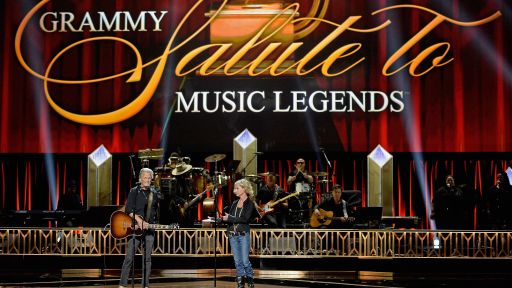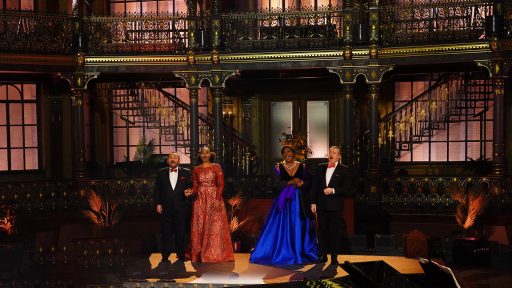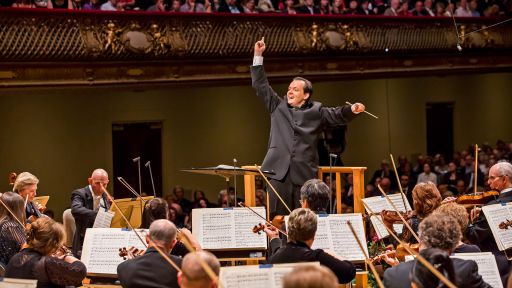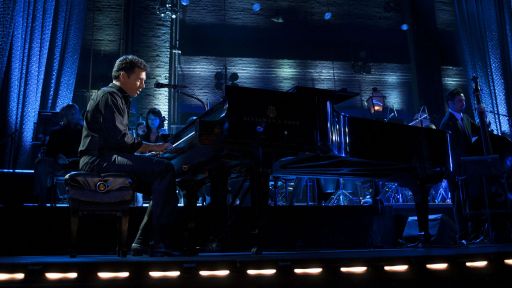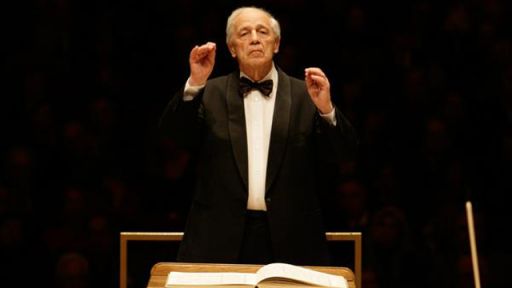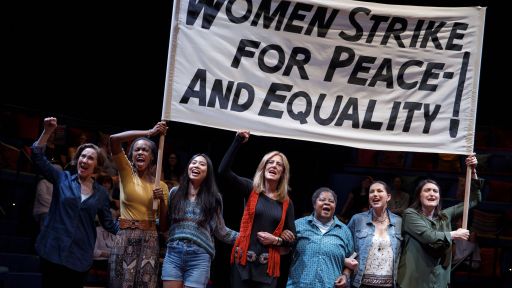Watch legendary composer John Williams’ and famed violinist Anne-Sophie Mutter discuss how Williams’ new concerto came about, the power of music during the pandemic, and their special relationship with Boston Symphony Orchestra and Tanglewood.
Features
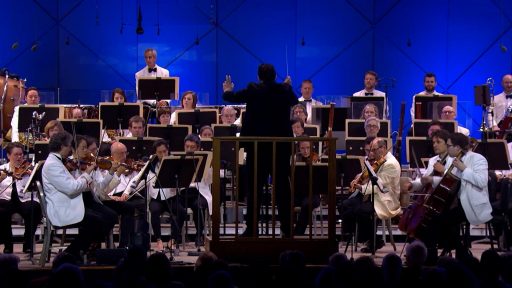
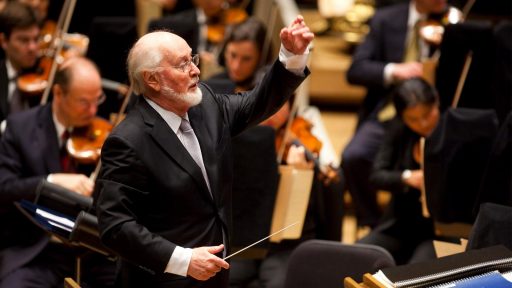
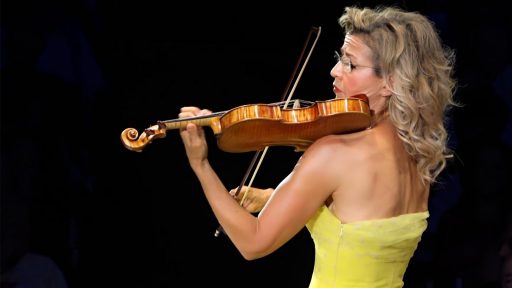
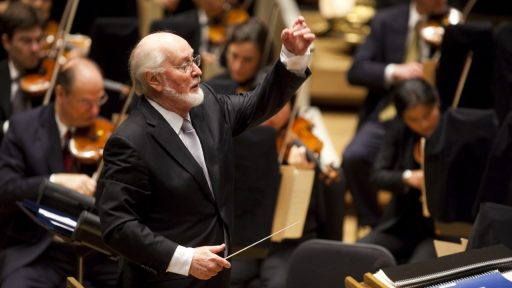
It always has been a dream of mine. And through the kooky situation, I think I worked my way from one bar, or five bars into now, a four movement concerto.
And I couldn't be happier because it's a gigantic piece.
The scope is gigantic. The idea behind it, this wonderful stem cell of jazz as, I think, the starting point is totally new in violin repertoire, and it reflects my, by accident I guess, my lifelong fascination and love for jazz as a music form, which requires incredible skills, maybe more skills than -- for me as a player definitively -- than just playing an existing score, inventing music in the instant.
So yeah, it has been a lifelong dream and I'm very lucky that some of my lifelong dreams come true. So yeah.
Well for me, it's a little bit of a different story in the sense that -- we actually speaking now in Tanglewood, which is where Anne-Sophie and I met some years ago.
And she asked me for a little piece of music, a few bars.
And so I sent her a piece with a little, few more bars and the relationship grew and somehow the little, few bars seem to suggest the middle movement of a concerto.
So somebody said -- Anne-Sophie or I said, we have already the middle movement of the concerto, why not make a full concerto? And so I began to do that, but the middle movement no longer served. So it became a new project.
For me as a composer, a great opportunity to have one of the world's greatest artists -- everybody understands that if I don't embarrass you by saying it publicly -- one of the world's greatest artists to ask a composer to do something for that for himself or for herself, that's a great challenge. And I thought to myself, oh my God, so many great violin concertos already in the world.
How can I produce another one that would have some value? I don't know.
I still don't know, but I will try.
And Anne-Sophie mentioned jazz in this and some of the things that we did together were some film themes -- nothing to do with the concerto.
And one of the pieces was Cinderella Liberty, a film that had sort of a jazz atmosphere in it.
And I thought, that's no good for Anne-Sophie, it's too much jazz.
She would never play it. And her late husband, Andre Previn, who everybody knows said to me, 'Anne-Sophie can play anything, don't worry, you write it for her.
She will play it.' So I gave it to her and I thought it would be, you know, very formal and exactly perfect. You know, it's a great concept artist and it was exactly perfect in idiom in what she's doing with the bow, so it become almost vocal. So instead of note, note, note, it becomes word, word, syllable, syllable, some kind of illusion connection between note to the next note, which is, which is a particular jazz thing.
The note one note was he had another notes there, but there's something in the middle of, you know, always had all music, but particularly in jazz, sometimes it's exaggerated that way.
And this lady from Germany who plays everything from Bach through Schoenberg and back again, would be doing this. And for me, that was once I discovered that I thought, ah, she can be very seductive.
She can be with many languages. And so there's something that was very important to me writing this, this feeling that I thought we could have together. Yeah.
Well composing for Anne-Sophie or for an orchestra for a concert delivers great freedom for a composer. You know, I spent my life writing music for exact timing.
And so I thought I knew everything about timing in music, everything from cartoons to everything you can imagine over 60 years of doing this. So when I completed the concerto, I said, it's 32 minutes.
I must be right. I was an expert in timing. Anne-Sophie said, 'No, it's 43 minutes long.' I felt, oh my God.
So for the first time last night we played it all the way through.
And it's 37 minutes. So she was off by five minutes.
And I was off by five minutes -- which in the film business, believe me, I've never been off by five minutes, not even five seconds.
So the answer to the question, what is different?
The difference is you have a landscape that could go this far, but then when you get into the landscape, you may want to go this far, even more. You see another mountain coming, you know, and you don't have to think, can I afford the time?
Have I got the 15 seconds to do it?
So it's a completely different mentality and opportunity and challenge. In film you have the subject -- the scene -- and we know how long the scene is, two minutes, 30 seconds.
And we know if it's loud or soft and fast or slow, that's already a given.
When you sit down, you don't have to invent that it's there.
So it's very different. But is the complete freedom, not also daunting. If suddenly anything is possible, then isn't the endless possibilities kind of hindering you because -- where to start? Do you actually start on -- because I know from Penderecki, he used to compose on already used paper because he couldn't stand the look of the white paper.
He had to start somewhere where it looked as if already something had been, you know, invented.
So that helped him to overcome the first steps into Neverland.
Yeah. Yes, I like that about papers. That's something I've done, but I think it's a life lesson that the way to do anything is to begin. And you sit down and you write the first measure.
It's never going to be that first measure anyway, but you already have it and now you can change it and you can attenuate it, extended, whatever.
So with what did you actually start, what was the stem cell of the concerto? Was it really the improvisando?
I must say, even though we still have it, I was very interested in the aspect of the harp doing the prologue to this and establishing something, a root of tonality that now the solo voice, which in this case is you, would contradict it and bring it back, you know, and that's sort of what happened. These are not the notes I started with, but it's approximately the idea. And put a few notes down, somewhat like Mr. Penderecki in the way I would take it off a page.
But I'm still an unreconstructed relic. I use a pencil and paper.
I have no computer. Wonderful. So, well, it's not wonderful. It makes me... But it's so creative. And then, you know, if one has the opportunity to look at a composer score -- think of Beethoven's score -- how much these scores tell us and how little information, zero information you have about the process if you look at a perfectly printed computer score. I hate that because it, it takes away the human touch in every sense of the way, the kind of struggle, the little, you know, moments of erasing.
We shouldn't throw away all these old sketches because I love Beethoven because you will see all of this thing. It gives an insight.
The fury, the desperation.
The struggle. You know, it looks like it's perfectly made. It was easy.
Anything but.
Well, I love the one thing with the aisling, you know, where the donkey, where he addresses his copyist as these [she speaks German]. Then of course the downside of the handwritten score is that maybe there is misreading of the copist. If you are not really carefully checking.
Well it is so complex that it took a while for me to really grasp the orchestration and the, and the size and the harmonic structure.
I haven't still, you know, really totally figured out.
And I was grateful to have the piano reduction, but I now understand better than ever before.
What you said when we had the piano rehearsal, the first rehearsal a few days previous to our orchestra rehearsal, that it is not even a shadow of what the orchestra in fact is sounding like -- what the orchestra means, what, what colors it evokes, what, you know, beauty and 3D music it is at the end. On the other hand, without the piano part, you would never, as a soloist, have the opportunity to get relatively close to the skeleton of the piece. So what was my first impression?
I was overwhelmed by the piece also by its technical difficulties. There are passages, which I personally find extremely challenging.
Extremely new runs, which are not obviously following the classical cluster and logic of development.
So it takes a lot of time.
It took me a lot of time and it was my lifeline.
It would have been my lifeline under other circumstances as well, but it became a kind of lifeline. You're a piece of music and that's why it, it is, you know, so deep ingrained in my heart because it happened during the period in which you couldn't do much else than compose, which is great, good for you.
But I couldn't do anything at all other than study at home, because we basically had, you know, quarantine and we needed to stay for months, restricted.
And so your music -- particularly the concerto -- became a very dear friend on a daily basis. And, you know, having emails and another version or small details, or, you know, information about change of Tempe, it gave me the time to really dig deeper then one usually can do in the hectic schedule of you having to write other things on the side, and me running around and having to perform standard repertoire while studying. So that was, um, that was a particularly precious moment, um, to have the time and to be part of a process which went over months for you. I think the composing and the revisiting.
Well, I think, I think the COVID period has given us all many things, a lot of discomfiture and concern, serious problem, but it also has given us time to think a little bit. For me, for my schedule doing this for you -- it was perfect because I had the time probably what may not have had as much time. And so that has been a gift in a way.
So we have that to be grateful for at least.
I started out with two things that I love.
The violin itself and Anne-Sophie. So, I already had a good base from which to begin this, but I'm a particular lover of the violin. It's, it's a wonderful antique, the sort of top level of the Lucius art for centuries.
They've been making little mental mandolins and guitars, and everything's a string and play and scratch on and so forth.
And we have now 250 years later, or so from the period of great greatest violin making, we have good makers now, but nothing like what we have been bequeathed by the past. As a piece of art, I love photographs of violin sitting in their cases.
I have many different colors, different wood and so forth. So on.
So the thing itself, not even the sound, just as a piece of art making and magic, gives us an opportunity for a violinist who has deprived of one finger. She has she, or he has to hold it with the thumb has only four fingers to do all this thing.
So you listen to what she's doing. Yeah.
And this is a disadvantage in your concerto. I need one finger more.
If you could put your thumb up here at the top of the, which Yo-Yo Mad can do on the cello. It's all right, because he goes here, but I would say, you go, you go any further, you're going to hurt your thumb.
It's only so high. And this one is doing the same thing with four fingers.
I'm looking at you on stage last night and thinking how is she doing this thing?
You need some espresso before playing, I think.
That is, if you think about it, it's impossible. You know, it's like on the piano. I mean, if you play a diatonic scale this way, separated by a 10th, it's all right. But if you separate C and E, now you start to go up here, which hand is over the which one? Yeah.
So that's what they're doing.
It is a broader range in the voice.
It sings more than the voice in a way, you know, you can have an octave or an interval of an octave, or a 10th or a 12th, that's it, you know, all of these things.
Hopefully with good intonation, otherwise it's not.. Yes! We have no frets on it. There's no time to take a piece of chalk.
It is, if you think about it, it's a miracle that this antique will give such expression in deep.
It's wonderful that you, as a non-violinist, are so in love with the instrument, because that's, that's precisely my feeling.
The piece of workmanship with wood, he takes a few tools and he carves the one that gets the best wood.
Even if you couldn't play it, it wasn't any good, it would still be a miracle.
That shape! How do you carve that shape!
The fact that every instrument has its own character and temper, that makes it even more amazing. It's a miracle because not, not one is like the other. Yeah.
It's also true of pianos by the way. They're very individual, well probably every instrument.
How did you like the piano backstage here in Tanglewood at the shed?
The one with the flowers on it.
I mean, I do think there's some traditions we should recognize and preserve that is the Steinway black as something that we love.
Imagine you would paint a violin, then of course you would run it because, well, I don't know how that Steinway sounds anyhow.
It's just an enormous privilege and joy and total fulfillment to play your music.
No matter if it's film music or the violin concerto. They are equally, uniquely, greatly crafted and insightful, and you know, you.
And that's, you know, what I admire part of you as a wonderful person, it's just is, you know, it's a situation really, and I'm not saying that lightheartedly, where the collaboration couldn't be, couldn't be happier or more inspiring, more fruitful, more uplifting, more challenging as well. And I personally need the challenge, because maybe the sky is the limit and the more you challenge me, you know, the better, or the more interesting as a violinist, I might become because as we talked or you talked at great length about the violin, the possibilities are limitless on this instrument.
And so let's go for it. You know, challenge me. Yeah.
Well, for me, collaboration is some, some aspect of collaboration is really not present here.
We don't sit together and work out tone, rows together, or express some kind of mathematical or theoretical, or even idealistic kind of creation of new music.
For me, it's rather been a very simple kind of romantic thing.
In this sense that, that she's a great artist.
She's an enormously attractive person mentally and in every way, and for me, it's, she, she is, I've had others in my life. She's a muse.
I write a song for Frank Sinatra. He sings it. Why do I do it?
Because it's Sinatra, you know, that that's enough. There he is an inspiration.
She is an inspiration.
They talk a lot about creativity. People write books about this is creative, like creative. And I say, why not an essay on inspiration, which is the mother of creativity that has to come first. And that, that is the inspiration. Eventually, maybe we're going to have some creativity out of this.
So it is personal. It's warm, it's simple.
It's not theoretical in the musical term, which could it be, why not, but it's not. It isn't that it's, it's a kind of a love affair.
I can say my wife will forgive me that way, but, and also tonight we have a concert and Anne-Sophie goes with me and my daughter comes with me. They're about the same age. So I say tonight, she's my other daughter.
I didn't get another one. I only got boys after that.
So I have one daughter and one boy. So this is my other one.
Now she's been inspirational as I listened to her play.
And it's enough that like go quickly to grab a pencil.
It's of course a clear sign, how much you obviously, and also myself, admire and love the orchestra, what Tanglewood is doing for a young generation.
I remember giving one of my, American first concerts here in Boston with, uh, with CG. And for many, many years, I used to come, to play under CG.
And this collaboration between the Boston symphony orchestra and CG, still stands in my memory as something uniquely amazing.
There was a music making of such spontaneity and freedom and refinement and personal dialogue, which I have rarely really heard.
And I don't want to offend anyone by saying it's a wonderfully also European sounding orchestra with that. I mean, it's an orchestra, which seems to be able to play any repertoire and find the right idiome, the right language, the right finesse.
It might be Copeland. And I don't find that often, neither in Europe, nor in the states. And, that has made my admiration for my, my colleagues in Boston, probably even greater and also the human atmosphere. It's just, I don't know what it is, but my colleagues, everybody around, you just feel like being part of a great family.
And every time I come to Tanglewood, I'm dreaming of being here longer with my children and seeing all my musician friends, particularly after that long period of not concertizing, it feels even more inspiring to be amongst so many amazing musicians and so many young conductors. Musicians who are up and coming and it's so necessary and important what Tanglewood is doing in. I remember Andre enjoying so much, you know, giving conducting causes and lessons and being amongst his beloved friends and touching base with a young generation, which we all need to infuse passion and, and love for the arts in, in the future.
Lovely. I love when you come here. It was difficult.
I think it's just to mention Boston and the Boston symphony, uh, it's one of our oldest orchestras in the United States, one of the greatest ones along the years. And, uh, it was the inspiration of Koussevitzky who was a conductor here for many years to develop this property now that we have here at Tanglewood, which was an inspiration.
And now we look at it and we see where the ecology of the world is being despoiled by parking lots and buildings, and everybody crowded into this or that, cars that you come here and still God's work if I can say is in existence, we have this beautiful terrain and trees and so on which we don't despoil, uh, in an overbuilding it and so on.
And I think of Tanglewood this way.
I think that that music for all of us, not just musicians, but whatever your musical taste is, is our oxygen. It's one, it's one of the things that makes us coalesce as a people with all this disparate traditions and so on. And so we need, we need oxygen and we need a place to go to be in nature.
And Tanglewood is a magnet and it brings the two things together.
We find them here.
We find nature here and we find music here. And that's what heals us now, particularly in this contemporary world, we need it so desperately.
And of course the educational component as Anne-Sophie says so wonderfully well, it's part of it. It's part of the energy of that.
But this place is the magnet and it brings us all together.
It brings us from Europe, come here and breathe it.
The air here is fabulous. And music here is fabulous.
And the idea of future of music is Fabrice. You can see it, the kids they're wonderful. So I, something we desperately need.
Thank heaven. We have it here. And a long may it prosper.
Well, people will ask me sometime.
Would you ever imagine writing a concerto for a world artist and playing with the Boston symphony orchestra? When I was very, very young and even doing my first film, or even before that where I might've been composing a commercial for Chevrolet, the television, or maybe even soap of some kind, it has to have a musical theme for it.
You know? So for me, the dream then would be not to do Tanglewood or do something with Anne-Sophie.
It would be to do a movie, any kind of a movie, obscene movie, a B-movie whatever.
So can I ever imagine coming here from earliest efforts in music, it's impossible. You know, how can you climb Everest? Life is not long enough. You know, Rachmaninoff said that, you know, life is, you know, it's not long enough for music. Uh, we have to live three times.
I haven't heard half of the heightened symphonies yet.
I haven't played half of the Beethoven works.
We're running out of time, you know?
So we have to go and study now.
Oh boy, I don't know, a 100th birthday is too much Anne-Sophie.
It would be so cool, in Berlin. Let's rock it.
Well, I have some weights, you know, and things that I do, which are now becoming very important for music, my music. Anyway, that is, but as far as Europe is concerned, I like to say that for many years, I didn't feel I had time to go to Europe and a year or so a year and a half ago. Finally, Vienna orchestra had to ask me to go, but I didn't.
I think it's too far. I don't have time. I finally went. And I think in fact, you were there and playing with me made it seem possible.
It made it seem reachable. Now, in what time I have left, I really hope I can spend more time in Europe. I want to go Leipzig.
I wanted to go to Hamburg. I want to go to Berlin. I hope back to Vienna.
We can be together. Venice too.
To the far east with your concerto. That's a plan would be good.
[Inaudible].
You May Also Like
